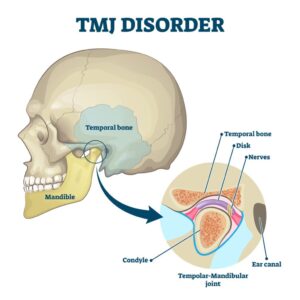Temporomandibular Joint (TMJ) disorder affects many people. It can cause pain and discomfort in your jaw, face, and neck. Fortunately, there are ways to manage TMJ disorder and find relief. In this article, you will learn simple strategies to ease your symptoms and improve your quality of life.
Key Takeaways
- TMJ disorder management affects the jaw and can cause pain.
- Home remedies can help ease symptoms.
- Dental care can provide treatment options.
- Explore options for correcting teeth alignment to enhance jaw health.
- Lifestyle changes can improve your condition.
- Professional help is available for severe cases.
Understanding TMJ Disorder Management

TMJ disorder management involves problems with the jaw joint and surrounding muscles. This joint connects your jaw to your skull. It helps you chew, talk, and yawn. When there is an issue, you may feel pain or discomfort. TMJ disorder can happen for many reasons, such as injury, teeth grinding, and stress.
Common Symptoms
You may notice several signs if you have TMJ disorder: – Jaw pain or tenderness – Pain in the face, neck, or shoulders – Clicking or popping sounds when moving your jaw – Difficulty chewing or opening your mouth – Headaches or earaches
These symptoms can vary from person to person. Some may have mild discomfort, while others may feel severe pain.
Causes of TMJ Disorder
Several factors can lead to TMJ disorder. Here are some common causes:
- Injury: A direct hit to the jaw can cause damage to the joint.
- Teeth grinding: Many people grind their teeth at night. This can stress the jaw.
- Stress: High stress levels can make you tense your jaw muscles. This can lead to pain.
- Misalignment: If your teeth do not fit together correctly, it can affect your jaw.
Understanding the cause of your TMJ disorder is essential. This knowledge can help you manage your symptoms.
Home Remedies for TMJ Disorder Management

There are many simple ways to relieve TMJ disorder at home. These methods can help reduce pain and increase comfort. Here are some you can try:
Warm or Cold Compress
Applying a warm or cold compress can help ease the pain. You can use a warm towel or a cold pack on your jaw for 15-20 minutes. This can reduce swelling and relax your muscles.
Gentle Jaw Exercises
Doing gentle exercises can help improve jaw movement. Try opening and closing your mouth slowly. You can also move your jaw from side to side. Repeat these exercises a few times a day.
Relaxation Techniques
Finding ways to relax can help reduce stress and jaw tension. Try deep breathing, meditation, or yoga. These methods can help calm your mind and body.
Avoid Hard Foods
Eating hard or chewy foods can worsen your symptoms. Stick to soft foods, such as yogurt, mashed potatoes, or smoothies. This can help reduce the strain on your jaw.
Maintain Good Posture
Your posture can affect your jaw. Try to sit and stand up straight. Keep your shoulders back and your head aligned with your spine. This can help reduce tension in your jaw.
Additional Home Remedies
- Use over-the-counter pain relievers as needed.
- Practice mindfulness to stay aware of jaw tension.
- Use essential oils, like lavender, for relaxation.
Dental Treatments for TMJ Disorder Management

Sometimes, home remedies are not enough. If your symptoms are severe, you may need to visit a dentist. Here are some common dental treatments for TMJ disorder:
Night Guards
Your dentist may recommend a night guard. This is a custom-made device that fits over your teeth. It helps reduce teeth grinding while you sleep. This can relieve pressure on your jaw and help prevent pain.
Corrective Dental Procedures
If your teeth are misaligned, your dentist may suggest corrective procedures. This can include braces or other orthodontics. The goal is to ensure your teeth fit together properly. You can learn more about the cost of these treatments to plan your options accordingly.
Physical Therapy
A physical therapist can teach you exercises to improve jaw movement. They can also show you techniques to reduce pain. This can be an effective way to manage TMJ disorder symptoms.
Medications
Your dentist may prescribe medications to help with pain. Over-the-counter options, like ibuprofen, may also be helpful. These can reduce inflammation and provide relief.
| Treatment Option | Description | Effectiveness |
|---|---|---|
| Night Guards | Custom devices to prevent teeth grinding | High for reducing pain |
| Physical Therapy | Exercises and techniques to improve jaw function | Moderate to high |
| Corrective Procedures | Aligning teeth through orthodontics | High if misalignment exists |
| Medications | Pain relief through prescribed or OTC options | Varies by individual |
Lifestyle Changes for Better Jaw Health

Making some lifestyle changes can help you with TMJ disorder management. Here are a few adjustments you can consider:
Stress Management
Finding ways to reduce stress can be beneficial. Try to set aside time for activities you enjoy. This could be reading, walking, or listening to music. Managing stress can help ease tension in your jaw.
Sleep Hygiene
Good sleep habits can make a difference. Aim for 7-9 hours of quality sleep each night. Create a calming bedtime routine to help you wind down. This can reduce stress and improve your overall well-being.
Limit Caffeine and Alcohol
Caffeine and alcohol can increase tension and stress. Try to reduce your intake of these substances. Instead, drink more water and herbal teas. This can help keep you calm and relaxed.
Stay Active
Regular physical activity can improve your overall health. Aim for at least 30 minutes of exercise most days. This can help reduce stress and tension in your body, including your jaw.
Professional Help for TMJ Disorder Management
If your symptoms persist, it is essential to seek professional help. A dentist can provide a thorough evaluation and recommend a treatment plan. They may refer you to a specialist if necessary.
Specialists to Consider
Different specialists can help with TMJ disorder:
- Oral surgeons can perform surgery if needed.
- Physical therapists can help with exercises and pain reduction.
- Psychologists can assist with stress management strategies.
| Specialist Type | Role in TMJ Treatment | When to Consult |
|---|---|---|
| Oral Surgeons | Surgical options for severe cases | Persistent pain despite other treatments |
| Physical Therapists | Rehabilitation through exercises | Difficulty with jaw movement |
| Psychologists | Strategies for managing stress and anxiety | When stress is a significant factor |
Conclusion
TMJ disorder management can cause pain and discomfort. However, there are many ways to manage it. Home remedies, lifestyle changes, and professional help can all improve your quality of life. Remember to listen to your body and seek help if you need it. You do not have to live with TMJ pain. Relief is possible.
Final Thoughts
TMJ disorder management often requires a combination of methods. Explore different options to find what works best for you. From home remedies to professional treatments, many paths can lead to relief. Your smile matters, so take care of your jaw health today.
Keeping informed about TMJ disorder can empower you in your healing journey. Remember, you are not alone in this. Many resources and professionals are available to support you. For more information, you can visit our website or contact us. Take the first step towards a pain-free life today!
